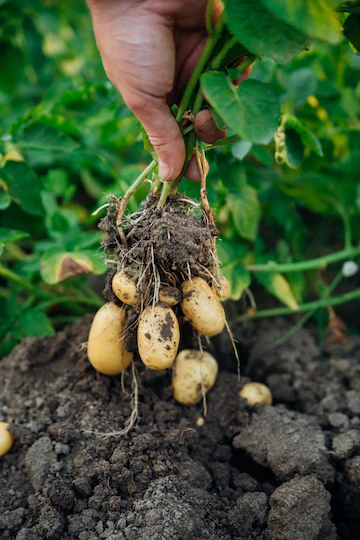When growing potatoes in South Africa, there are several infections and diseases that you should watch out for to ensure the health and productivity of your potato plants. Here are some common ones:
- Late Blight (Phytophthora infestans): This is a devastating disease for potatoes. It causes dark, water-soaked lesions on leaves, stems, and tubers. Late blight thrives in cool and moist conditions, making it a significant concern in certain regions of South Africa, particularly during the rainy season.
- Early Blight (Alternaria solani): Early blight is another fungal disease that affects potato plants. It leads to the development of brown lesions with concentric rings on the leaves, which can spread to the stems and tubers. It thrives in warm and humid conditions.
- Bacterial Soft Rot (Erwinia spp.): This bacterial disease causes rotting and decay of potato tubers. It typically occurs after the harvest during storage and can result in significant losses. Proper handling and storage practices can help prevent bacterial soft rot.
- Potato Virus Y (PVY): PVY is a viral disease that affects potato plants. It causes stunted growth, leaf discoloration, and reduced tuber yield. Aphids are the primary vectors for spreading the virus, so controlling aphid populations is crucial in preventing PVY infections.
- Blackleg (Pectobacterium and Dickeya species): Blackleg is a bacterial disease that affects both potato plants and tubers. It causes dark, rotten areas on stems and tubers, leading to plant wilting and reduced yields. Good hygiene practices, such as using certified disease-free seed potatoes, can help prevent blackleg.
- Powdery Scab (Spongospora subterranea): Powdery scab is a soil-borne disease that affects potato tubers. It causes raised, corky lesions on the skin, giving them a rough, scabby appearance. Maintaining proper soil moisture levels and using resistant potato varieties can help manage powdery scab.
To protect your potato crop from these infections and diseases, it is important to practice good agricultural practices, including:
- Using certified disease-free seed potatoes.
- Rotating potato crops with non-host plants.
- Implementing proper irrigation practices to avoid excessive moisture.
- Ensuring good soil drainage.
- Monitoring and controlling pests, such as aphids, that can transmit viruses.
- Applying appropriate fungicides or bactericides if necessary.
- Maintaining field hygiene by removing and destroying infected plant debris.
Regular monitoring of your potato plants and early detection of any signs of disease are crucial for effective management. Consult with local agricultural extension services or potato experts for specific recommendations based on your region in South Africa.
Join 'Farmers Mag' WhatsApp Channel
Get the latest Farming news and tips delivered straight to your WhatsApp
CLICK HERE TO JOIN






